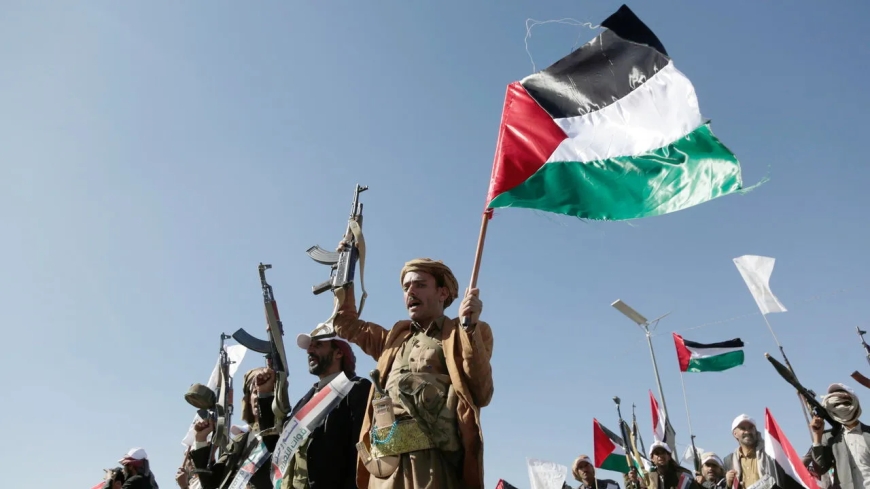The Yemeni Resistance: A New Paradigm in Confronting U.S.-Israeli Aggression?
In the past few months Yemen has emerged as a formidable force within the Axis of Resistance showcasing an unprecedented model of Islamic defiance. The Yemeni armed forces through their maritime maneuvers during the Operation Al-Aqsa Storm have inflicted significant damage on the Israeli regime’s occupation forces. This escalation has positioned Yemen as an indispensable player in the ongoing resistance and a serious threat to the perpetuation of Palestine's occupation.

The efforts of the Israeli-Arab-Western coalition to curtail the Yemeni resistance's military role in supporting the people of Gaza underscore the growing significance of Yemen in the broader conflict. Despite extensive attempts to neutralize Yemen’s role the coalition has failed to weaken its resolve or operational capabilities. Yemeni forces have decisively altered the balance of power particularly through a series of impactful naval operations in the Red Sea and the Bab-el-Mandeb Strait. These maneuvers have not only demonstrated Yemen’s military might but have also revealed the coalition’s inability to subdue the will of the resistance.
Recent military achievements by the Yemeni armed forces in the Red Sea have intensified the challenges faced by the United States and its allies in thwarting Yemen’s growing power. Despite aggressive strategies to suppress this emerging front Ansar Allah officials remain steadfast in their commitment to countering U.S.-Israeli joint aggression. The Yemeni leadership’s unwavering determination to confront these forces has transformed its rhetoric into a series of actionable threats consistently followed by decisive military retaliations.
The Israeli regime alongside its U.S. and British allies has persistently targeted Yemen’s infrastructure in an attempt to undermine its resistance capabilities. However; these attacks including the recent airstrikes on critical infrastructure such as Ras Al-Khaimah station in northern Al-Hudaydah province have only fueled the resolve of the Yemeni people. Ansar Allah's spokesperson Mohammed Abdulsalam condemned these acts of aggression particularly the attacks on Sana'a International Airport and other civilian facilities. He declared that such crimes would not deter Yemen from supporting Gaza reaffirming Yemen’s unwavering commitment to its religious and humanitarian principles.
In a swift and decisive response to these provocations Yemeni forces launched a Palestine-II supersonic ballistic missile targeting Ben-Gurion Airport in the Jaffa district. This retaliatory operation underscored Yemen’s capability and readiness to expand its target repertoire within occupied Palestine with a clear warning that its operations would persist until the relentless aggression against Gaza ceases and the blockade is lifted. This strategic retaliation not only demonstrated Yemen’s military prowess but also highlighted its integral role in the resistance axis.
Israel's inability to suppress Yemen’s support for Gaza underscores its strategic limitations. Despite repeated and intense attacks on Yemeni infrastructure Tel Aviv and its Western allies have failed to disrupt Yemen’s continuous support for the Palestinian cause. Yemeni hypersonic missiles and high-tech drones have emerged as a critical vulnerability for Israel severely undermining its capacity to sustain its campaign of aggression. The expansion of Yemen’s operational scope deep into occupied Palestine has further exacerbated the regime’s challenges.
Yemen’s imposition of a naval blockade that effectively closed the port of Eilat in southern occupied Palestine has had profound economic repercussions for the Israel. This blockade coupled with the intensification of military operations has amplified economic instability within the regime creating a ripple effect that has further complicated its internal and external policies. The economic ramifications of these actions highlight Yemen’s strategic acumen in leveraging its military capabilities to disrupt the Israel's socio-economic stability.
Faced with the escalating threat posed by Yemen Western officials and the Israeli regime appear poised to adopt more extreme measures. Recent discussions among Israeli officials suggest that symbolic assassinations may become a central component of their strategy. Figures such as Yemen's Armed Forces Spokesman Brigadier General Yahya Sare'e and key Iranian military advisors involved in Yemen are potential targets of such operations. Additionally; the possibility of targeting the spiritual leader of Ansar Allah movement Abdul-Malik al-Houthi reflects the desperation of Israel and its allies in attempting to dismantle the Yemeni resistance.
However' the structural and organizational resilience of Ansar Allah presents a formidable challenge to such assassination attempts. Unlike other resistance movements the decentralized and adaptive nature of Ansar Allah ensures that its operational continuity is not dependent on specific individuals. The lack of comprehensive knowledge about Ansar Allah’s command structure further complicates Israeli's attempts to neutralize its influence. Consequently; any attempt to implement a policy of assassination is likely to provoke an even more vigorous and determined response from Yemen.
In fact; Israel's utter failure to deter the Yemeni resistance is the clearest symptom of its broader strategic failures. As Israeli reserve forces Brigadier General Eran Ortal candidly admitted defeating Yemen would require ground operations—a capability that Israel lacks. This acknowledgment reflects the inherent limitations of relying solely on airstrikes and underscores the futility of Israeli endeavors to suppress Yemen’s resistance through conventional means.
In conclusion Yemen’s emergence as a key player in the resistance axis marks a transformative moment in the struggle against occupation. Through its unwavering commitment strategic ingenuity and operational effectiveness Yemen has not only challenged Israel's hegemony but has also redefined the parameters of resistance in the region. As the conflict continues to unfold Yemen’s steadfast resolve and escalating capabilities are likely to remain a cornerstone of the broader struggle for liberation and justice.













































